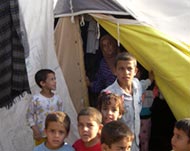Child malnutrition soars in Iraq
Young children in Iraq are suffering from acute malnutrition, which a series of new surveys say has nearly doubled since the US-led invasion of the country last year.

The Washington Post reported on Sunday that the rate of acute malnutrition among Iraqi children under five has shot up to 7.7% this year, according to a study by Iraq’s health ministry, Norway’s Institute for Applied International Studies and the United Nations.
This translates to roughly 400,000 Iraqi children suffering from “wasting,” a condition characterised by chronic diarrhoea and dangerous protein deficiencies.
Iraq‘s malnutrition rate had steadily declined to 4% just two years ago.
The surveys suggest the silent human cost being paid across a country convulsed by instability and mismanagement.
Analysts attribute the increase in malnutrition to dirty water and to unreliable supplies of electricity needed to make it safe by boiling.
Crumbling infrastructure
By one count, 60% of rural residents and 20% of urban dwellers have access only to contaminated water. The country’s sewer systems are in disarray.
Nutrition surveys indicate that conditions are worst in Iraq‘s largely poor south, but doctors say malnutrition occurs wherever water is dirty, parents are poor and mothers have not been taught how to avoid disease.
 |
|
Children are paying a high price |
In poorer areas, where people rely on kerosene to fuel their stoves, high prices and an economy crippled by unemployment aggravate poor health.
The March 2003 invasion and the widespread looting in its aftermath severely damaged the basic structures of governance in Iraq, and persistent violence across the country has slowed the pace of reconstruction almost to a halt.
In its most recent assessment of five sectors of Iraq‘s reconstruction, the Washington-based Center for Strategic and International Studies said health care was worsening at the quickest pace, the Washington Post report said.
Violence has also driven away international aid agencies that brought expertise to Iraq after the invasion.
Instability and violence
Since a truck bombing at the UN headquarters in Baghdad killed more than 20 people last year, UN programmes for Iraq have operated from neighbouring Jordan, the paper said.
Doctors Without Borders, a group known for its high tolerance for risk and one of several that has helped revive Iraq‘s health ministry, evacuated this autumn.
And CARE International closed down in October after the director of its large Iraq operation, Margaret Hassan, was kidnapped. She is now presumed to be dead.
The Atlanta-based charity had remained active in Iraq through three wars, providing hospitals with supplies and sponsoring scores of projects to offer Iraqis clean drinking water, the Washington Post said.